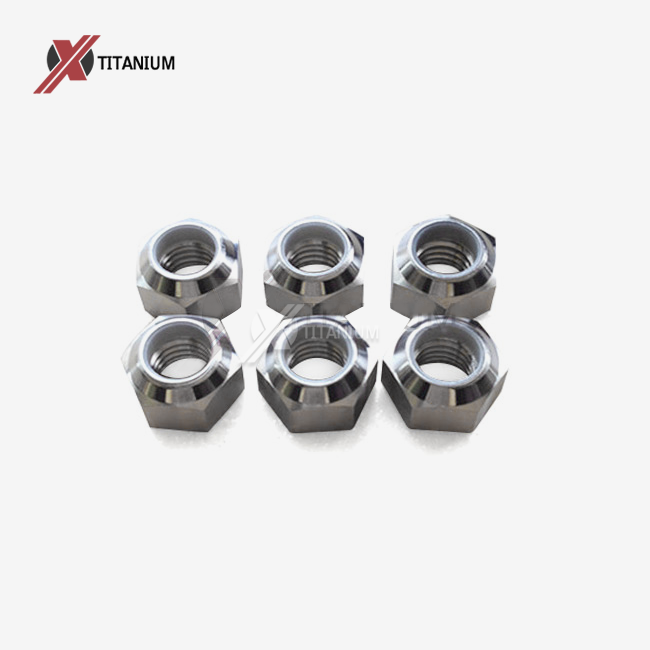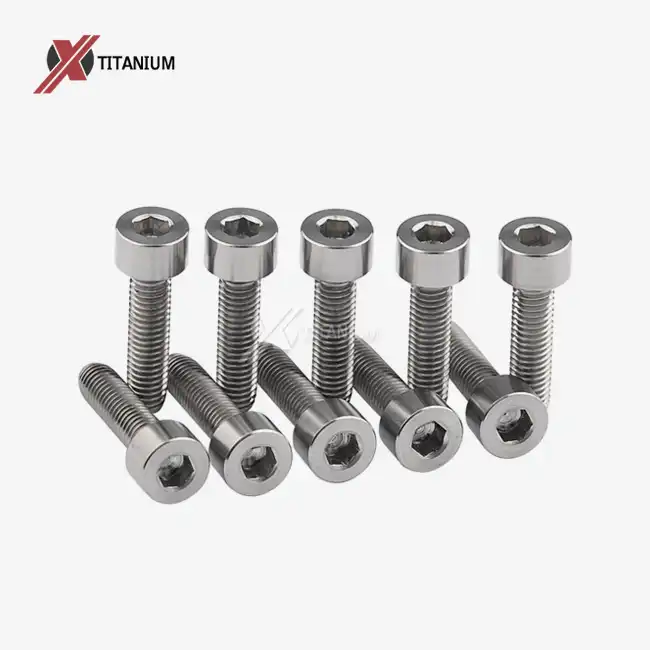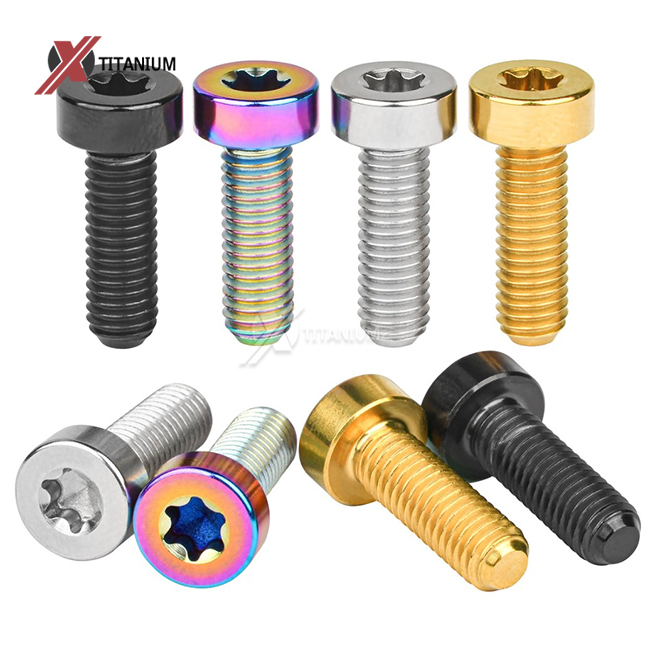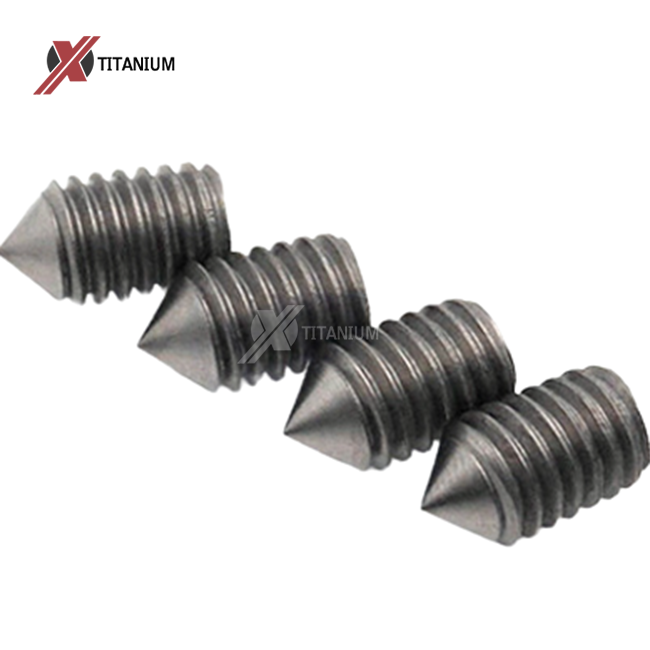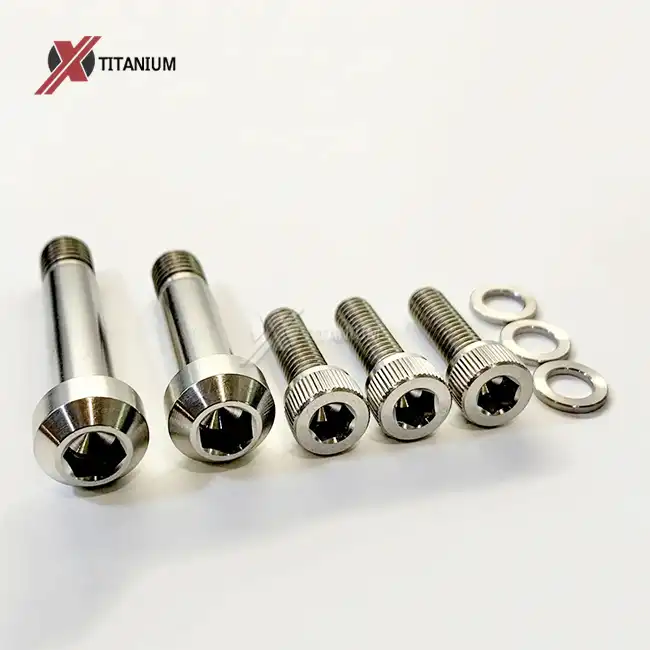The Unique Properties of Titanium Lock Nuts in Racing Applications
Unmatched Strength-to-Weight Ratio
Titanium lock nuts have revolutionized the racing industry with their exceptional strength-to-weight ratio. This property is paramount in the world of motorsports, where every gram counts. Titanium, being 45% lighter than steel but with comparable strength, allows racing teams to significantly reduce vehicle weight without compromising on structural integrity. This weight reduction translates directly into improved acceleration, better handling, and increased fuel efficiency - all critical factors in gaining a competitive edge on the track.
Moreover, the strength of titanium lock nuts ensures they can withstand the extreme forces and vibrations encountered during high-speed racing. Unlike conventional steel nuts, it maintains their structural integrity even under severe stress, reducing the risk of fastener failure that could lead to catastrophic consequences during a race. This reliability is invaluable in an environment where component failure can mean the difference between victory and defeat, or worse, jeopardize driver safety.
Superior Vibration Resistance
One of the standout features of titanium lock nuts is their exceptional vibration resistance. In the high-octane world of racing, vehicles are subjected to intense vibrations that can loosen or damage standard fasteners over time. Titanium lock nuts, however, possess inherent properties that make them highly resistant to these vibrational forces.
The atomic structure of titanium allows for greater elasticity compared to other metals. This means that titanium lock nuts can absorb and dissipate vibrational energy more effectively, reducing the likelihood of loosening or fatigue failure. Additionally, the self-locking feature of these nuts, often achieved through deformed threads or inserts, provides an extra layer of security against vibration-induced loosening.
This superior vibration resistance is crucial in maintaining the structural integrity of various vehicle components throughout a race. From engine mounts to suspension systems, titanium lock nuts ensure that critical connections remain secure, allowing drivers to push their vehicles to the limit with confidence. The reduced risk of component failure due to vibration not only enhances performance but also significantly improves safety on the track.
Exceptional Heat Resistance
In the scorching environment of a race car, where temperatures can soar to extreme levels, the heat resistance of titanium lock nuts proves invaluable. Titanium has a melting point of 1,668°C (3,034°F), significantly higher than that of steel or aluminum. This exceptional heat resistance ensures that product maintain their structural integrity and performance characteristics even in the hottest areas of the vehicle, such as near the engine or exhaust system.
The ability to withstand high temperatures without losing strength or becoming brittle is crucial in racing applications. It allows engineers to use titanium lock nuts in areas where other materials would fail, ensuring consistent performance throughout the race. Moreover, the thermal expansion rate of titanium is lower than that of many other metals, which means that titanium lock nuts are less likely to loosen due to thermal cycling - a common issue in racing where components are subjected to rapid heating and cooling cycles.
This heat resistance also contributes to the longevity of titanium lock nuts. While other fasteners might need frequent replacement due to heat-induced degradation, it can endure multiple races without compromising their performance. This durability not only enhances reliability but also offers potential cost savings in the long run, despite the higher initial investment in titanium components.
The Impact of Titanium Lock Nuts on Racing Performance
Weight Reduction and Its Effects on Speed
The use of titanium lock nuts plays a significant role in the overall weight reduction strategy of racing teams. While a single titanium lock nut might only save a few grams compared to its steel counterpart, the cumulative effect across hundreds of fasteners in a vehicle can lead to substantial weight savings. This reduction in weight has a cascading effect on various aspects of racing performance.
Firstly, a lighter vehicle requires less energy to accelerate, resulting in improved acceleration times. This advantage is particularly noticeable in sprint races or during overtaking maneuvers where rapid acceleration can make the difference between winning and losing. Secondly, reduced weight enhances the vehicle's agility, allowing for quicker direction changes and improved cornering speeds. This improved handling can be crucial on twisty circuits where maneuverability is key.
Moreover, a lighter vehicle puts less stress on its tires, potentially extending tire life and allowing for more strategic pit stop planning. It also improves fuel efficiency, which can be a decisive factor in endurance races where every pit stop counts. The weight savings from titanium lock nuts, combined with other lightweight components, contribute to a more efficient and competitive racing machine.
Enhanced Reliability and Safety
The reliability provided by titanium lock nuts is a cornerstone of racing safety and performance. In the high-stakes world of motorsports, component failure can have severe consequences, ranging from lost races to potential accidents. The superior strength, vibration resistance, and heat tolerance of products significantly reduce the risk of fastener failure, enhancing overall vehicle reliability.
This increased reliability translates directly into improved safety for drivers. Critical components secured with titanium lock nuts are less likely to fail under the extreme conditions of a race, reducing the risk of accidents caused by mechanical failure. Furthermore, the consistent performance of titanium lock nuts throughout a race allows drivers to push their vehicles to the limit with confidence, knowing that their safety is not compromised.
From a performance perspective, enhanced reliability means fewer DNFs (Did Not Finish) due to mechanical issues. This consistency is crucial in championship races where every point matters. Teams can focus more on strategy and less on worrying about potential fastener failures, allowing for more aggressive racing tactics.
Long-term Cost Benefits
While titanium lock nuts may have a higher upfront cost compared to traditional fasteners, their long-term benefits often outweigh this initial investment. The exceptional durability of titanium means that these lock nuts can withstand multiple races and rigorous testing sessions without needing replacement. This longevity results in reduced maintenance costs and downtime over the course of a racing season.
Moreover, the reliability of titanium lock nuts can lead to significant cost savings by preventing expensive failures. In racing, a single component failure can result in a DNF, potentially costing a team valuable championship points and prize money. By reducing the risk of such failures, it contributes to the overall financial health of a racing team.
Additionally, the weight savings provided by titanium lock nuts can have indirect cost benefits. Lighter vehicles are generally more fuel-efficient, which can lead to savings in fuel costs over the course of a season. They also put less stress on other components such as tires and brakes, potentially extending the life of these parts and reducing overall maintenance costs.
Future Trends in Titanium Lock Nut Technology for Racing
Advancements in Manufacturing Processes
The future of titanium lock nuts in racing is closely tied to advancements in manufacturing processes. Emerging technologies like 3D printing and advanced CNC machining are opening up new possibilities for designing and producing titanium lock nuts with even more optimized geometries and properties.
Additive manufacturing, in particular, holds promise for creating products with complex internal structures that could further enhance their strength-to-weight ratio and vibration resistance. This technology also allows for rapid prototyping and customization, enabling racing teams to develop specialized lock nuts for specific applications or track conditions.
Moreover, advancements in titanium alloy development are likely to yield new materials with even better properties. For instance, research into beta titanium alloys could lead to lock nuts with improved strength and ductility, further enhancing their performance in racing applications. These new alloys might also offer better machinability, potentially reducing production costs and making titanium lock nuts more accessible to a broader range of racing teams.
Integration with Smart Technologies
As racing continues to embrace cutting-edge technologies, we may see the integration of smart features into titanium lock nuts. For example, the development of lock nuts with embedded sensors could provide real-time data on torque, temperature, and vibration. This information could be invaluable for predictive maintenance, allowing teams to identify potential issues before they lead to failures.
Another possibility is the development of titanium lock nuts with shape memory properties. These could potentially adjust their tension in response to temperature changes, ensuring optimal performance across varying racing conditions. Such adaptive fasteners could revolutionize how racing teams approach vehicle assembly and maintenance.
Furthermore, advancements in surface treatment technologies might lead to titanium lock nuts with even better friction properties or enhanced corrosion resistance. This could extend their applicability to new areas of the vehicle or improve their performance in extreme environments, such as in off-road or maritime racing.
Sustainability and Recycling Initiatives
As the racing industry, like many others, moves towards more sustainable practices, we're likely to see increased focus on the lifecycle management of titanium lock nuts. While titanium is already valued for its durability and longevity, future initiatives may focus on improving the recyclability of these components.
Advanced recycling technologies could make it more economically viable to recover and reuse titanium from used lock nuts, reducing the environmental impact of their production. This could lead to the development of closed-loop systems where used titanium lock nuts are recycled into new ones, minimizing waste and reducing reliance on raw material extraction.
Conclusion
Titanium lock nuts have firmly established themselves as a crucial component in modern racing, offering an unparalleled combination of strength, lightweight properties, and reliability. Their ability to enhance vehicle performance while ensuring safety makes them an invaluable asset for racing teams striving for that competitive edge. As technology continues to advance, we can expect to see even more innovative applications of titanium lock nuts in the racing world, further cementing their status as a go-to solution for high-performance fastening needs.
For those interested in exploring the benefits of titanium lock nuts for their racing applications, or to learn more about our range of high-quality titanium products, please don't hesitate to reach out. Contact us at info@cltifastener.com or djy6580@aliyun.com for expert advice and solutions tailored to your specific racing needs.
